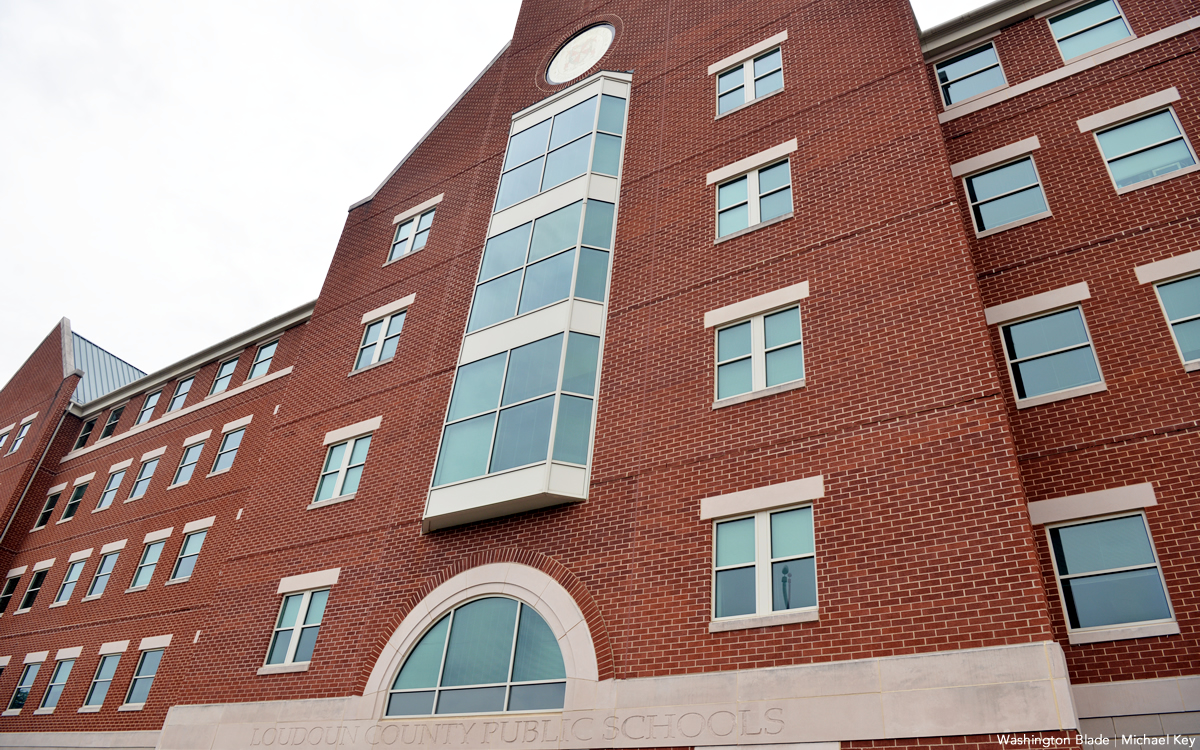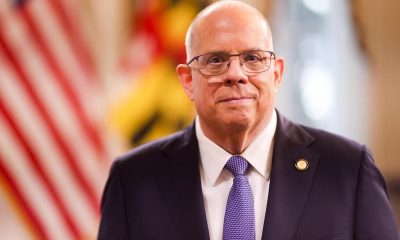Local
Maryland House passes trans bill
Protection act has supporters in the Senate; measure passed by wide margin

The Maryland House of Delegates voted 86-52 on Saturday to pass legislation that would ban discrimination against transgender Marylanders in the area of employment, housing and credit.
The vote came after a 50-minute debate in which delegates supporting the Gender Identity Anti-Discrimination Act urged their colleagues to help end what they called an injustice against fellow citizens whom they said have been denied jobs and housing solely because of their gender identity.
“This is a huge demonstration in support of fairness today,” said Morgan Meneses-Sheets, executive director of Equality Maryland, the state LGBT group that led lobbying efforts to pass the bill.
“We still have work to do,” she said. “We’ve got to get it through the Senate. But we are overjoyed with the outcome today.”
Meneses-Sheets and other advocates for the bill said they were hopeful the measure would clear the Senate Judicial Proceedings Committee in the next week and receive a favorable vote in the full Senate.
The Maryland Legislature adjourns for the year on April 11, and all legislation must clear both houses before then.
Saturday’s vote in favor of the gender identity bill in the 141-member House fell largely along party lines. Eighty-five Democrats and just one Republican voted for the bill. Forty Republicans and 12 Democrats voted against it. Three delegates — two Republicans and one Democrat — were absent and did not vote.
The House’s approval of the gender identity bill by a sold 34-vote margin appears to indicate that transgender rights, while controversial, hasn’t elicited the intensity of opposition that surfaced over a Maryland same-sex marriage bill.
A bill calling for legalizing civil marriage for same-sex couples died in the House of Delegates two weeks ago when Democratic leaders withdrew the bill from the floor after determining they did not have the votes to pass it. The Maryland Senate passed the bill by a vote of 25-21 on Feb. 25.
Some activists feared that the heated controversy over the decision to withdraw the marriage bill before a vote might make delegates less likely to support any LGBT-related bill, including a transgender rights bill.
A number of House Democrats who wavered over or announced plans to drop their support of the marriage bill voted for the gender identity bill on Saturday. Among them were Dels. Sam Arora (D-Montgomery County), Tiffany Alston (D-Prince George’s County) and Jill Carter (D-Baltimore City).
During Saturday’s floor debate over the gender identity bill, opponents, including Del. Joseph Minnick (D-Baltimore County) and Del. Richard Impallaria (R-Baltimore and Harford Counties) raised concerns that the bill would enable men who “cross dress” as women to create disturbances in the workplace or threaten women in public or workplace bathrooms.
“Every woman should be appalled by this legislation,” said Minnick, who told of once encountering a male-to-female transgender person in a public men’s bathroom at the state capital in the 1990s.
“That left a lasting impression on me,” he said. “The way that person was dressed [he] could have very easily gone into the lady’s room and used the lady’s facility. Now I don’t think that’s what you want with this kind of legislation.”
A few of the delegates opposing the bill pointed to the 1970s television program M.A.S.H., which included a character named Maxwell Klinger. They noted the Klinger character dressed in female clothes at a U.S. Army installation in Korea during the Korean War as a ploy to obtain a “Section 8” psychiatric discharge from the military.
Minnick said the gender identity bill could hurt businesses by allowing cross dressing “scammers” like the Klinger character to create problems at the workplace and file a lawsuit if the employer sought to fire the person.
Del. Dan Morhaim (D-Baltimore County), who served as floor leader for the bill, disputed claims that it would impact public bathrooms, saying the legislation did not include a public accommodations provision and would make no changes in the availability of public bathrooms to transgender people.
When asked by opponents whether transgender employees protected under the bill’s employment non-discrimination provision would have access to workplace bathrooms, Morhaim said that would be left to the discretion of an employer.
Del. Kirill Reznick (D-Montgomery County), a supporter of the bill, said that while public bathrooms were not covered in the Gender Identity Non-Discrimination Act, transgender non-discrimination laws that do include public accommodations protections have not created problems — either related to bathrooms or at the workplace.
“The reality is 12 states have passed broader protections that this bill,” he said. “A hundred and thirty-four jurisdictions — counties and cities across this country — have boarder protections than this bill. And we have not heard of one instance where businesses have had to build a third bathroom, where children or women have been attacked and these protections were used as a defense — not one case in 10 years,” he said.
Del. Joseline Pena-Melnyk (D-Prince George’s and Anne Arundel Counties), the author and lead sponsor of the bill, expressed dismay over what she called “unfounded” assertions that transgender people cause problems at the workplace or in bathrooms.
“In the last few minutes I have heard some things that are truly sad,” she said. “The reason why we need this bill is because of what you heard today. People have preconceived ideas and prejudices.”
Pena-Melnyk said she was troubled that opponents were basing much of their opposition on perceived problems that could not result from the bill, in part, because she removed a public accommodations provision to expand the support needed to pass the bill.
“And I did so because the political reality is that I could not have gotten the bill out — look at the discussion today — if I had public accommodations in it,” she said. “But it gives you protections.”
Del. Maggie McIntosh (D-Baltimore City), one of seven openly lesbian or gay members of the House of Delegates, noted that transgender protections were omitted entirely from a Maryland law banning discrimination based on sexual orientation that the legislature passed 10 years ago.
“It was a calculated decision and one that I frankly regret,” she said, referring to the omission of a transgender provision. “I think it was the wrong decision. And this bill today, House Bill 235, rights a very bad wrong that we need to do,” she said. “And I ask you to support House Bill 235, a very important step forward to end discrimination in Maryland.”
Transgender rights advocate Dana Beyer, who ran for a seat in the House of Delegates last year, called approval of the bill by the House historic.
“We still have two more votes to go to get this bill done and then we need to work on adding public accommodations next year,” she said. “Actually, the only statement from the opponents with which I agree was, you know, if you give them this now they will come back and say they want full civil rights. And, yeah, that’s the case. We want full civil rights, and we’ll get them one step at a time.”
Virginia
DOJ seeks to join lawsuit against Loudoun County over trans student in locker room
Three male high school students suspended after complaining about classmate

The Justice Department has asked to join a federal lawsuit against Loudoun County Public Schools over the way it handled the case of three male high school students who complained about a transgender student in a boys’ locker room.
The Washington Blade earlier this year reported Loudoun County public schools suspended the three boys and launched a Title IX investigation into whether they sexually harassed the student after they said they felt uncomfortable with their classmate in the locker room at Stone Bridge High School in Ashburn.
The parents of two of the boys filed a lawsuit against Loudoun County public schools in U.S. District Court for the Eastern District of Virginia in Alexandria. The Richmond-based Founding Freedoms Law Center and America First Legal, which White House deputy chief of staff Stephen Miller co-founded, represent them.
The Justice Department in a Dec. 8 press release announced that “it filed legal action against the Loudoun County (Va.) School Board (Loudoun County) for its denial of equal protection based on religion.”
“The suit alleges that Loudoun County applied Policy 8040, which requires students and faculty to accept and promote gender ideology, to two Christian, male students in violation of the Equal Protection Clause of the 14th Amendment to the U.S. Constitution,” reads the press release.
Assistant Attorney General Harmeet K. Dhillon of the Justice Department’s Civil Rights Division in the press release said “students do not shed their First Amendment rights at the schoolhouse gate.”
“Loudoun County’s decision to advance and promote gender ideology tramples on the rights of religious students who cannot embrace ideas that deny biological reality,” said Dhillon.
Outgoing Virginia Gov. Glenn Youngkin and outgoing Virginia Attorney General Jason Miyares in May announced an investigation into the case.
The Virginia Department of Education in 2023 announced the new guidelines for trans and nonbinary students for which Youngkin asked. Equality Virginia and other advocacy groups claim they, among other things, forcibly out trans and nonbinary students.
The U.S. Department of Education’s Office of Civil Rights in February launched an investigation into whether Loudoun County and four other Northern Virginia school districts’ policies in support of trans and nonbinary students violate Title IX and President Donald Trump’s executive order that prohibits federally funded educational institutions from promoting “gender ideology.”
District of Columbia
Capital Pride announces change in date for 2026 D.C. Pride parade and festival
Events related to U.S. 250th anniversary and Trump birthday cited as reasons for change

The Capital Pride Alliance, the D.C. based group that organizes the city’s annual LGBTQ Pride events, has announced it is changing the dates for the 2026 Capital Pride Parade and Festival from the second weekend in June to the third weekend.
“For over a decade, Capital Pride has taken place during the second weekend in June, but in 2026, we are shifting our dates in response to the city’s capacity due to major events and preparations for the 250th anniversary of the United States,” according to a Dec. 9 statement released by Capital Pride Alliance.
The statement says the parade will take place on Saturday, June 20, 2026, with the festival and related concert taking place on June 21.
“This change ensures our community can gather safely and without unnecessary barriers,” the statement says. “By moving the celebration, we are protecting our space and preserving Pride as a powerful act of visibility, solidarity, and resistance,” it says.
Ryan Bos, the Capital Pride Alliance CEO and President, told the Washington Blade the change in dates came after the group conferred with D.C. government officials regarding plans for a number of events in the city on the second weekend in June. Among them, he noted, is a planned White House celebration of President Donald Trump’s 80th birthday and other events related to the U.S. 250th anniversary, which are expected to take place from early June through Independence Day on July 4.
The White House has announced plans for a large June 14, 2026 celebration on the White House south lawn of Trump’s 80th birthday that will include a large-scale Ultimate Fighting Championship (UFC) event involving boxing and wrestling competition.
Bos said the Capital Pride Parade will take place along the same route it has in the past number of years, starting at 14th and T Streets, N.W. and traveling along 14th Street to Pennsylvania Ave., where it will end. He said the festival set for the following day will also take place at its usual location on Pennsylvania Avenue, N.W., between 2nd Street near the U.S. Capitol, to around 7th Street, N.W.
“Our Pride events thrive because of the passion and support of the community,” Capital Pride Board Chair Anna Jinkerson said in the statement. “In 2026, your involvement is more important than ever,” she said.
District of Columbia
Three women elected leaders of Capital Pride Alliance board
Restructured body includes chair rather than president as top leader

The Capital Pride Alliance, the D.C.-based group that organizes the city’s annual LGBTQ Pride events, announced it has restructured its board of directors and elected for the first time three women to serve as leaders of the board’s Executive Committee.
“Congratulations to our newly elected Executive Officers, making history as Capital Pride Alliance’s first all-women Board leadership,” the group said in a statement.
“As we head into 2026 with a bold new leadership structure, we’re proud to welcome Anna Jinkerson as Board Chair, Kim Baker as Board Treasurer, and Taylor Lianne Chandler as Board Secretary,” the statement says.
In a separate statement released on Nov. 20, Capital Pride Alliance says the restructured Board now includes the top leadership posts of Chair, Treasurer, and Secretary, replacing the previous structure of President and Vice President as the top board leaders.
It says an additional update to the leadership structure includes a change in title for longtime Capital Pride official Ryan Bos from executive director to chief executive officer and president.
According to the statement, June Crenshaw, who served as acting deputy director during the time the group organized WorldPride 2025 in D.C., will now continue in that role as permanent deputy director.
The statement provides background information on the three newly elected women Board leaders.
• Anna Jinkerson (chair), who joined the Capital Pride Alliance board in 2022, previously served as the group’s vice president for operations and acting president. “A seasoned non-profit executive, she currently serves as Assistant to the President and CEO and Chief of Staff at Living Cities, a national member collaborative of leading philanthropic foundations and financial institutions committed to closing income and wealth gaps in the United States and building an economy that works for everyone.”
• Kim Baker (treasurer) is a “biracial Filipino American and queer leader,” a “retired, disabled U.S. Army veteran with more than 20 years of service and extensive experience in finance, security, and risk management.” She has served on the Capital Pride Board since 2018, “bringing a proven track record of steady, principled leadership and unwavering dedication to the LGBTQ+ community.”
• Taylor Lianne Chandler (Secretary) is a former sign language interpreter and crisis management consultant. She “takes office as the first intersex and trans-identifying member of the Executive Committee.” She joined the Capital Pride Board in 2019 and previously served as executive producer from 2016 to 2018.
Bos told the Washington Blade in a Dec. 2 interview that the Capital Pride board currently has 12 members, and is in the process of interviewing additional potential board members.
“In January we will be announcing in another likely press release the full board,” Bos said. “We are finishing the interview process of new board members this month,” he said. “And they will take office to join the board in January.”
Bos said the organization’s rules set a cap of 25 total board members, but the board, which elects its members, has not yet decided how many additional members it will select and a full 25-member board is not required.
The Nov. 20 Capital Pride statement says the new board executive members will succeed the organization’s previous leadership team, which included Ashley Smith, who served as president for eight years before he resigned earlier this year; Anthony Musa, who served for seven years as vice president of board engagement; Natalie Thompson, who served eight years on the executive committee; and Vince Micone, who served for eight years as vice president of operations.
“I am grateful for the leadership, dedication, and commitment shown by our former executive officers — Ashley, Natalie, Anthony, and Vince — who have been instrumental in CPA’s growth and the exceptional success of WorldPride 2025,” Bos said in the statement.
“I look forward to collaborating with Anna in her new role, as well as Kim and Taylor in theirs, as we take on the important work ahead, prepare for Capital Pride 2026, and expand our platform and voice through Pride365,” Bos said.




















